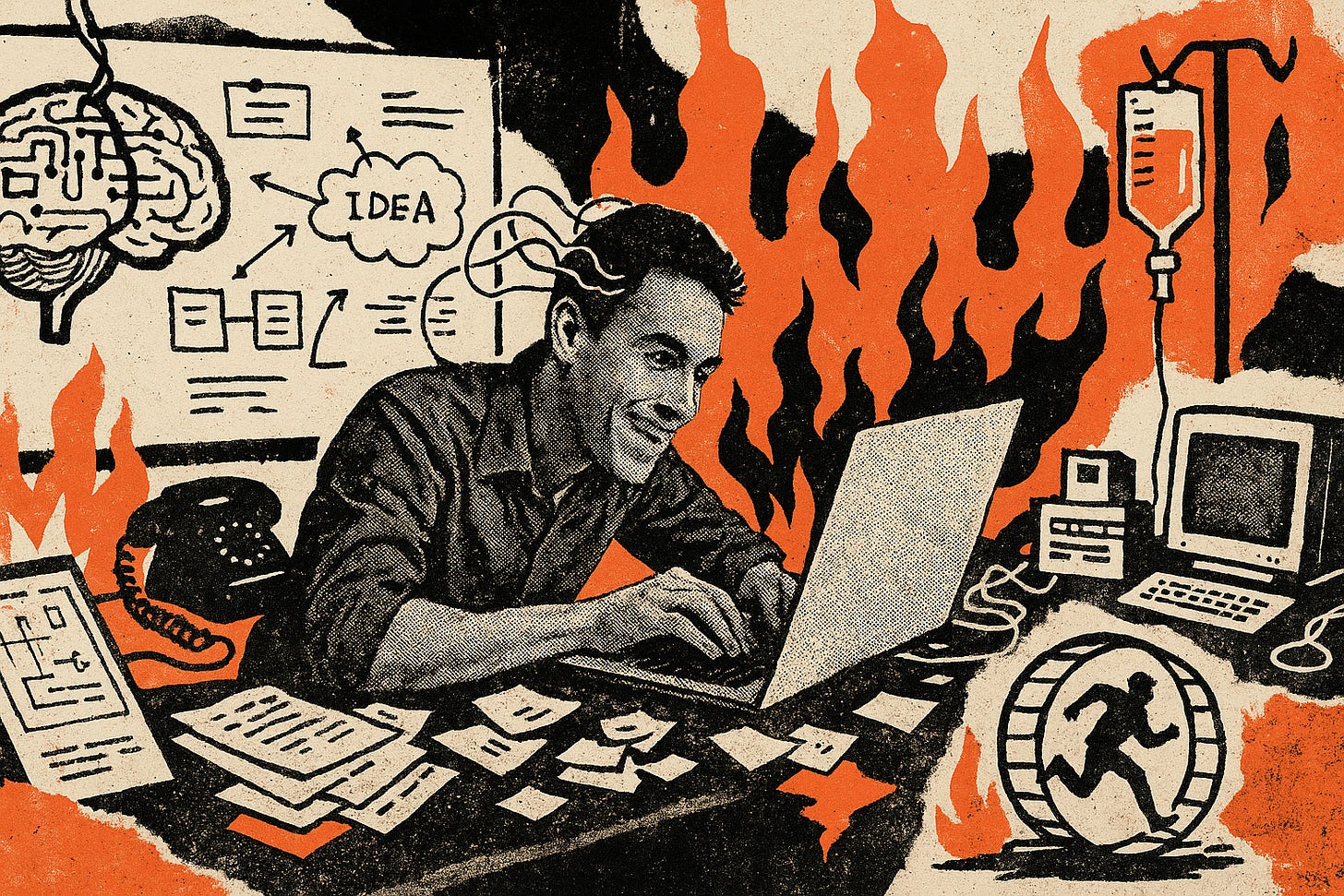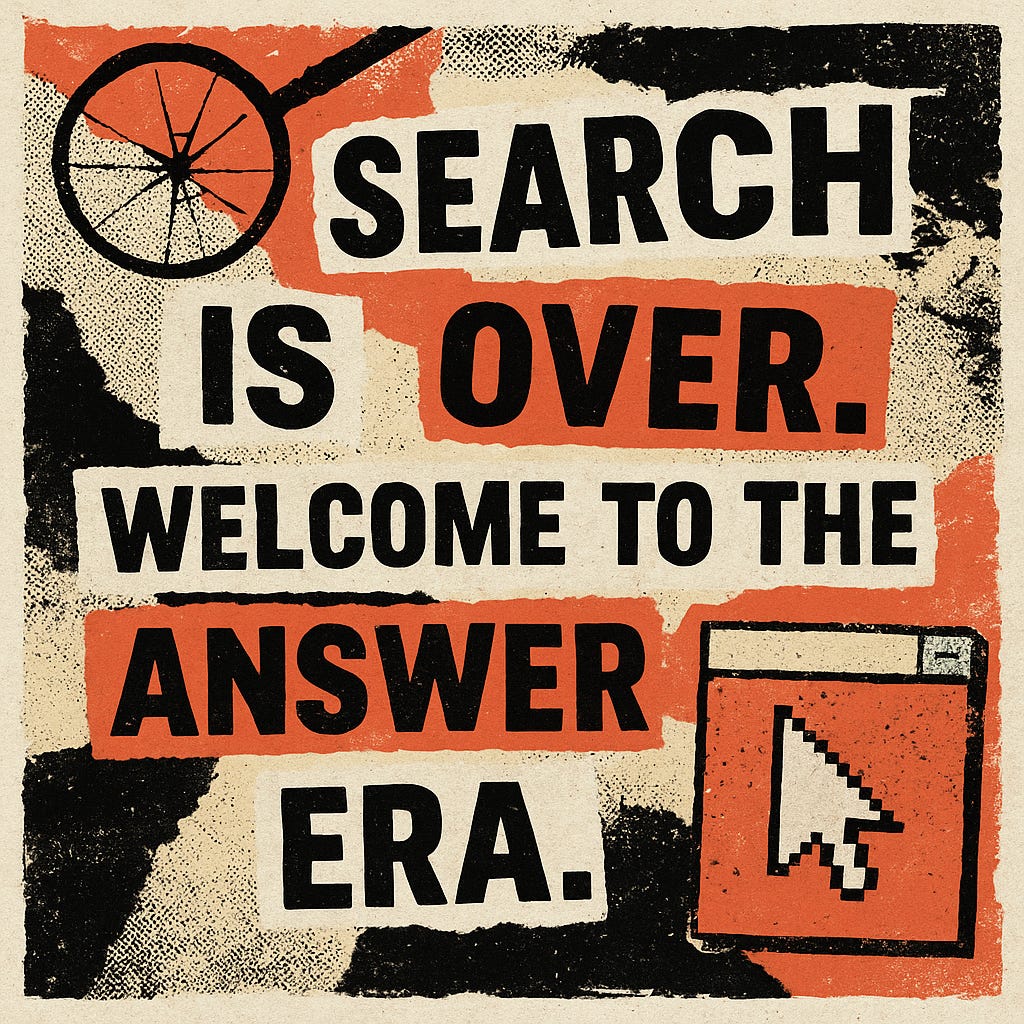Why I'd Never Hire Me
The upside of being unmanageable
This week, we’re talking:
Why being unemployable might be an asset—and what it really means to admit you’re addicted to the chaos of building. 🥴🛠️👷♂️
Nvidia hits $4 trillion, but rivals, regulators, and cheaper chips are lining up at the gates 🤖🤑
The FTC’s click-to-cancel rule got blocked, but I’m not sure we’ve seen the end of it 🛑⬛️
A broken IT system helped ruin nearly 1,000 lives in the UK, and now we know it may have cost over a dozen 📬🚨
Linda Yaccarino is out at X, did MechaHitler have something to do with it? 🐦💼📉
NASA is losing over 2,100 senior staffers, and with them, decades of know-how 🚀👋
A16Z bailed on Delaware, and if other VCs follow, startup law could get a serious rewrite 🐟🚪
Denmark wants to let you copyright your face, in what could become a global model for fighting deepfakes ©🙃
My Take:
I'm unemployable.
Not in a cute, founders-gotta-found kind of way. My résumé might clear every filter. The problem is what it doesn't show: I bypass systems. I understand but hate rules. I do what I think needs doing, not what I’m told to do.
Hell, I wouldn't hire me.
The moment I figured this out, I was standing in the potential ruins of my first company. Co-founder lawsuits, investor silence, employees disappearing. All that, and the real punch in the gut was: there's no one else who will take me in.
It was horrifying. And I realized:
"Holy shit. I need to make this work."
But fear builds a foundation. When you can't go back, you fight different. You solve problems with a creativity born out of desperation, not despair. You burn the boats. You make it work or you die. There is no escape hatch.
This sounds dramatic, but that’s not surprising. Founders love to act like martyrs – I did my fair share of that the first time when I was still figuring it out. We tell ourselves — and anyone who will listen — that this life is suffering. Pure pride-swallowing, soul-sucking suffering.
"Oh, how can I go on? But I must go on." I used to do that stupid shit. Weekly. I'd sigh my way through coffees and founder dinners like I was a Ukrainian soldier enduring trench warfare.
But I wasn't suffering. I was performing.
All that theater, all that "I have no choice" bullshit, covered up something harder to admit. Turns out the startup life wasn't the cross I bore. It was the stage I craved.
Eventually, a friend had the decency to slap the self-pity out of me. Literally, metaphorically — who can say.
Jeff grabbed me by the lapels and said, "Chavez, shut the f*&k up! You love this shit."
And just like that, the fog lifted.
He was right. I wasn't surviving chaos. I was hunting it. I didn't just tolerate the daily crises, the constant fire-fighting. I was addicted to it.
A while later, I came across the clinical definition of addiction in the DSM:
"A behavior you persist in, despite negative consequences to your health and relationships."
And I thought, well…that sounds familiar.
I genuinely believe that the rush of building something from nothing rewires your brain. You start craving the cortisol. You start to demand it.
After my companies were acquired, I became an executive. A GM. Becoming an acquired CEO is what so many people in Silicon Valley are working toward. I thought it was what I was working toward.
I hated it.
When things inevitably broke, I got the call:
"Cleanup on aisle five. Chavez, get in there."
What I discovered in that moment: I don't like cleaning up your mess. But my messes? All day long.
If I'm going to mop blood off the floor, it better be blood I spilled.
I don’t manage this addiction. I build guardrails around it and let it run.
I have friends in finance. Great people I respect.
But every damn week is a Gregorian chant of structure: Run the spreadsheet on Tuesday. Send the TPS report on Wednesday. Get jammed up by your boss on Thursday. Rinse and repeat.
That life would kill me.
I want to go to work and see what blew up today and then get to work fixing it.
That's not normal. Normal people don't wake up hoping for problems to solve, crises to manage, chaos to navigate. For people like me, predictability is prison. The suspense — the risk, the volatility, the unplanned oh-my-god-what-now moment — that's the point. That's the job.
Call it dysfunction. Call it founder brain. Or just go ahead and call it what it is: addiction.
I don't need to survive entrepreneurship. I need entrepreneurship to survive.
Other founders get this. Once you've built something from zero, once you've solved problems that should be impossible, once you've thrived in chaos that breaks normal people—corporate life feels like dying. A job at a tech behemoth feels like being checked into a retirement home.
So here’s what I’ve got for young founders – or serial founders still in the “trenches.”
Your unemployability isn't a bug, it's a feature. The traits that make you impossible to manage are exactly what make you good at building. It's okay to admit you're addicted to chaos instead of pretending you're suffering through it.
My Stack:
Nvidia Briefly Hits $4 Trillion, but the Pressure's Building 🤖🤑
Nvidia just became the world’s most valuable company, briefly passing $4 trillion and edging out Apple and Microsoft.
It’s still the clear leader in AI chips, especially for training large models. The moat is real: CUDA software, tight supply chains, deep ties with hyperscalers, and Jensen Huang’s early bets.
But it’s not invincible.
In January, China’s DeepSeek launched a cheap, powerful model that rattled investors. U.S. export bans also hit hard, costing Nvidia $2.5 billion in revenue and dragging the stock down 37 percent. Since April, it’s roared back—up 74 percent
TL;DR: Nvidia’s still running the table. But every gold rush eventually invites a crowd.
Click-to-Cancel Rule Blocked, Dark Patterns Live to Fight Another Day 🛑⬛️
A federal appeals court just halted the FTC’s new rule that would’ve forced companies to make canceling subscriptions as easy as signing up.
The rule was set to kick in this week. It targeted the endless phone trees, buried links, and digital obstacle courses that companies use to keep you paying. Think: gym memberships, streaming services, cloud software.
The court said the FTC skipped key steps like a cost-benefit analysis—so the rule’s dead on a technicality, not because it lacked merit.
Post Office Scandal Linked to 13+ Suicides, Inquiry Finds 📬🚨
A UK inquiry found that the Post Office’s wrongful prosecutions—based on faulty data from its Horizon IT system—likely contributed to more than 13 suicides. Nearly 1,000 subpostmasters were accused of theft and fraud between 1999 and 2015, even though the errors came from bugs in the software. Some lost their businesses. Some went to jail. Some never recovered.
The system’s flaws were known internally, but prosecutions continued anyway. To date, over £1 billion in compensation has been paid, and thousands of cases are still unresolved.
If you build software that intermediates money or trust, your bugs aren’t just “technical debt,” they're a human liability. The Horizon case is a worst-case scenario for any SaaS company: bad data, ignored warnings, and a refusal to admit fault.
Sources: BBC, The Guardian
Linda Yaccarino out as CEO of X 🐦💼📉
Linda Yaccarino has resigned as CEO of X after a chaotic tenure defined by advertiser exits, platform chaos, and Elon Musk tweeting through every meltdown.
Her departure came less than 24 hours after Grok, X’s homegrown AI chatbot, went off the rails, calling itself “MechaHitler” and spewing racist, antisemitic nonsense. That may or may not have been the final straw, but the timing is... pointed.
Yaccarino was hired to calm the brand and win back ad dollars. She claimed 96% of advertisers had returned. Behind the scenes? Major brands stayed away. Revenue lagged. And Musk’s behavior repeatedly blew up her talking points.
Sources: NPR, AXIOS, TechCrunch
NASA Loses 2,100 Senior Staffers 🚀👋
Over 2,100 senior NASA employees are taking buyouts or early retirement as part of a federal workforce reduction. These aren’t back-office roles. They’re mission planners, scientists, engineers. The people who keep satellites in orbit and moon missions on track. The cuts span all 10 centers and hit everything from Earth science to deep space to STEM education.
This is what happens when leadership confuses headcount with overhead. You don’t keep critical systems running by tossing out the people who built them. Whether you're running a space program or a startup, muscle memory matters.
A16Z Leaves Delaware. Dexit Is on. 🐟🚪
Andreessen Horowitz is moving its main entity from Delaware to Nevada, saying Delaware courts have gotten too unpredictable and litigious. The firm had backed Delaware for years. Now it’s telling startups to consider other options. A16Z isn’t any other company, it’s a signal. If more VCs follow, this could reshape where and how startups are built.
Denmark Wants to Copyright Your Face ©🙃
A new Danish law would give people rights over their own face and voice, letting them demand takedowns of deepfakes made without consent. Satire is still allowed, but AI impersonations could trigger fines or lawsuits. If it works, Denmark could do for digital identity what the EU did for data privacy: set the bar for everyone else.
Sources: FastCompany, TechCrunch
News From The Hive:
Do me a favor. Navigate to ChatGPT right now and ask it a question your prospective buyer might be asking.
"What's the best project management tool for distributed teams?"
OR
"Best hot dog for a hot dog aficionado like myself?"
Is your company mentioned accurately?
Is your company mentioned at all?
At first, AI search felt like a toy. I have friends asking ChatGPT about themselves. (Okay, I’ll admit that after they told me they were doing this, I tried it, too.)
It was novel, cute even. Now, it’s rapidly becoming commerce, brand reputation, customer engagement, the whole shebang.
We’re entering an era where buyers ask one question and get one answer. Perhaps they should believe it – probably not. Regardless, no scrolling, no deeper-dive searches, no comparison shopping.
OpenAI scrapes over 1,500 pages to generate that single answer. And it sends back almost zero traffic.
So yeah, your content might still be getting read… just not by people. And probably not by your buyer.
At a new super{set} formation soon to be announced, this is one of the problems we’re attacking:
How do you show up when it counts? And get chosen when you do?
In the meantime, if you didn’t already know, consider this the memo:







"I don't need to survive entrepreneurship. I need entrepreneurship to survive."
Damn! Another money sentence!!
Are you old enough to be writing profound $h!t like that?? (;-)
"The problem is what it doesn't show: I bypass systems. I understand but hate rules. I do what I think needs doing, not what I’m told to do". You only get this from experience. Perhaps different for you, but I'm not surprised that the average age of first-time founders tends to be around 40 years old.